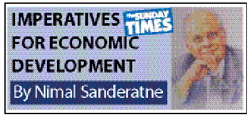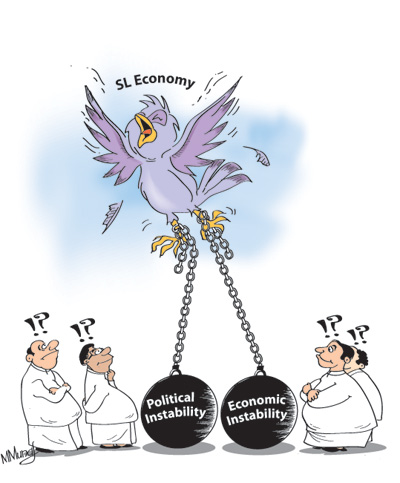Columns
Sustained economic growth the challenging task in the next decade
View(s): Sri Lanka’s economic growth that reached 8 per cent in the two years after the war declined to 6.4 per cent in 2012, increased to 7.2 per cent in 2013 and picked up to reach 7.4 per cent in 2014. The economy is expected to grow by only 6.5 per cent this year. Growth may in fact be lower than 6.5 per cent this year owing to political and economic uncertainties, the impending elections and stoppage of foreign funded infrastructure development.
Sri Lanka’s economic growth that reached 8 per cent in the two years after the war declined to 6.4 per cent in 2012, increased to 7.2 per cent in 2013 and picked up to reach 7.4 per cent in 2014. The economy is expected to grow by only 6.5 per cent this year. Growth may in fact be lower than 6.5 per cent this year owing to political and economic uncertainties, the impending elections and stoppage of foreign funded infrastructure development.
What is of concern is not this short-term setback, but the medium- and long-term trajectory of growth that is likely to be less than 6.5 per cent. The growth of the economy depends very much on the policy framework and political stability after the parliamentary elections.
Growth for human development
An annual average economic growth of 6.5 per cent is needed to achieve the very high levels of human development envisaged in Dr. Godfrey Gunatilleka’s paper “A Vision for Sri Lanka 2025 & 2035-Pre-Requisites of Very High Human Development” discussed last Sunday. The discussants at this seminar were of the view that achieving such a high growth rate was difficult owing to fundamental weaknesses in the economy.
 Achieving a 6.5 per cent annual average growth over the next decade is a challenging task requiring a number of prerequisites, including political stability, macroeconomic stability, well-defined predictable economic policies and economic and social reforms.
Achieving a 6.5 per cent annual average growth over the next decade is a challenging task requiring a number of prerequisites, including political stability, macroeconomic stability, well-defined predictable economic policies and economic and social reforms.
The fundamental economic weaknesses are a large foreign debt, a high fiscal deficit, declining government revenue as a proportion of GDP, low domestic savings and large trade deficits. Weak institutional capacities, educational and knowledge gaps and a weak political culture do not support high economic growth. Furthermore, low incentives for better allocation of resources among different uses leads to low total factor productivity that in turn means that higher savings are needed to maintain the same growth rate.
Inadequate revenue
Dr. Saman Kelegama pointed out that high growth based on foreign debt capital, as in the recent past, was impractical in the future. This implied the need for more domestic resources and foreign investment. High growth is not possible with government revenue declining to as low as 12 per cent of GDP from 18-20 per cent several years ago. The present level of revenue is only adequate to service the debt and in some recent years not even adequate for debt servicing.
Dr. Kelegama, who was a member of the Presidential Taxation Commission, said that it had made specific proposals to increase revenue that have not been implemented. A fundamental weakness in revenue is the excessive reliance on indirect taxation. Indirect taxes account for 80 per cent of revenue while direct taxes contribute only 20 per cent to revenue. He said that it was important to increase tax revenue by eliminating excessive tax exemptions. Improving tax compliance and reducing tax avoidance are also vital to increase tax revenue. It is not only the amount of revenue obtained, but from what sources these are obtained has relevance for human development.
Investment
Investment and how the required investment is obtained are important in ensuring economic growth. Increasing domestic savings is crucial to increasing investment and achieving growth and high human development.
The investment environment is crucial to get the private sector to increase investment. Dr. Gunatillaka relies more on the Government to increase investments. The economic history of the developing world in the last three decades shows that reliance on government to carry the burden is misplaced as they are not the “guardian angels” of Western liberal democracies of the past.
Very high human development countries are mostly democracies that took a long time to get to that position. Today they can afford to provide health and education services to their citizens because they have grown over a long period, have mature democracies and have well run institutions that are elements not found in Sri Lanka.
Dr. Indrajit Coomaraswamy was also of the view that achieving an annual average growth of 6.5 per cent was difficult. He pointed out that the 8 per cent growth in 2010 and 2011 was partly a peace dividend and in 2012 growth fell to 6.4 per cent. Growth picked up to 7.2 in 2013 and to 7.4 in 2014 owing to large foreign-debt-funded investment in infrastructure.
That option was no longer available and domestic savings are inadequate to generate high growth.Much of the growth would have to come from higher foreign direct investment that has been inadequate in the past. Policy reforms that are conducive for foreign investment are vital to generate a high growth momentum.
A new economic strategy
New economic strategies are needed to achieve high levels of economic growth that would ensure the goals of human development discussed in Dr. Gunatilleka’s provocative paper. It is not only the rate of economic growth that matters, but the means and manner by which the economy grows. The strategy and process of economic development should not undermine social and human development, values, poverty reduction, social equity and equitable income distribution. It should ensure equality before the law and democratic and human freedom and the protection of the environment.
The preservation of the environment is important for expanding tourism as the country’s scenic beauty is the foremost attraction. The rationale for protecting the environment, however, goes beyond that as the environment is important for the quality of life of residents themselves.
Can we achieve an annual average growth of 6.5 per cent in the next decade to attain very high levels of human development?
Further reflections
Dr. Gunatilleka’s paper not only underscored the need to bear in mind that human development is the end of economic growth, but also that human development cannot be achieved by economic growth alone. The investment strategy, the amount of public investment, emphasis on education and health are all prerequisites to achieving very high levels of human development.
While public expenditure is vital at early stages of economic development, private social expenditure increases as per capita incomes rise. The affluent tend to spend money on private education, including supplementary tuition and health facilities. Weaning away the affluent from public education and health is important to make public expenditure provide more qualitative health and education services for the lower income families.


Leave a Reply
Post Comment